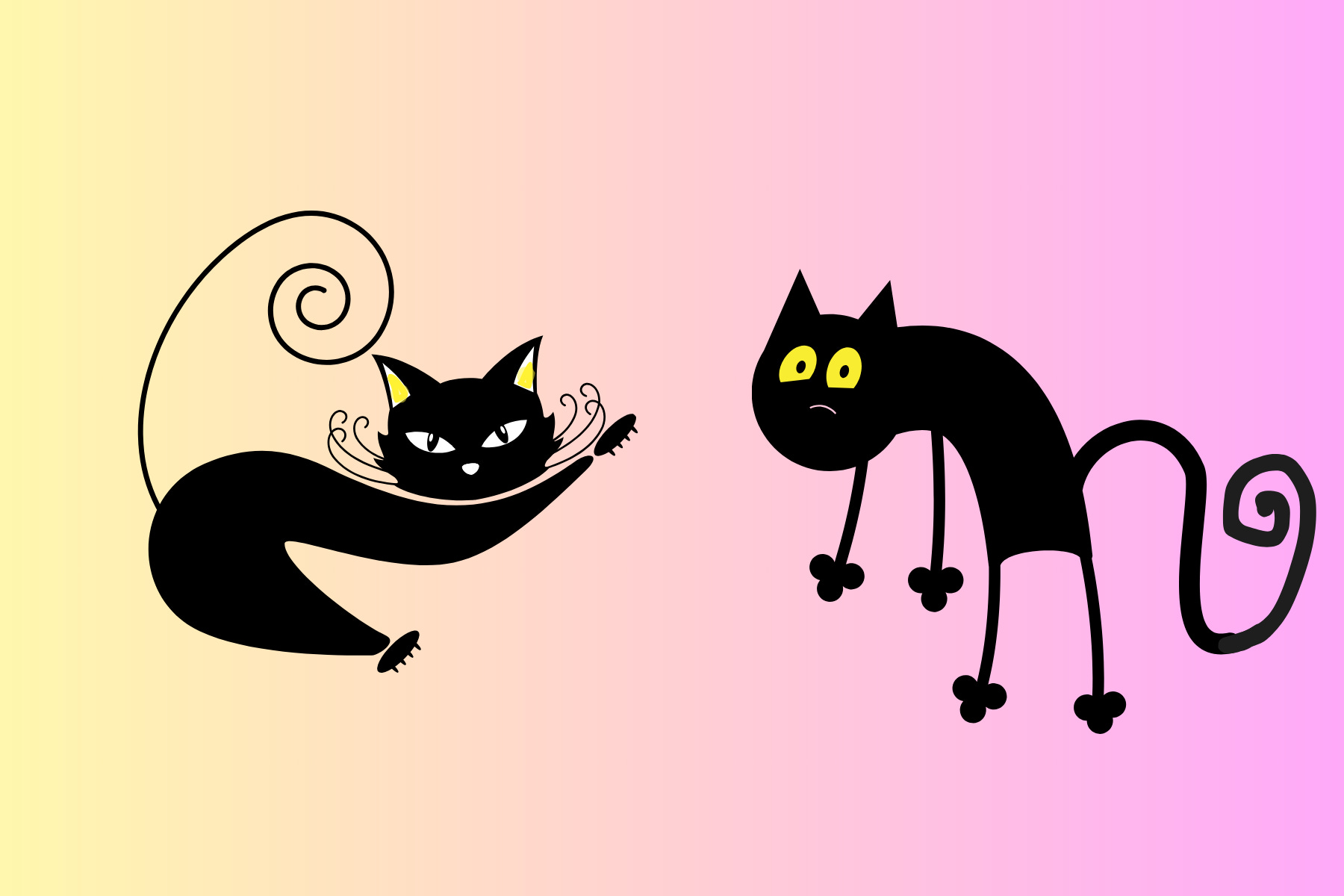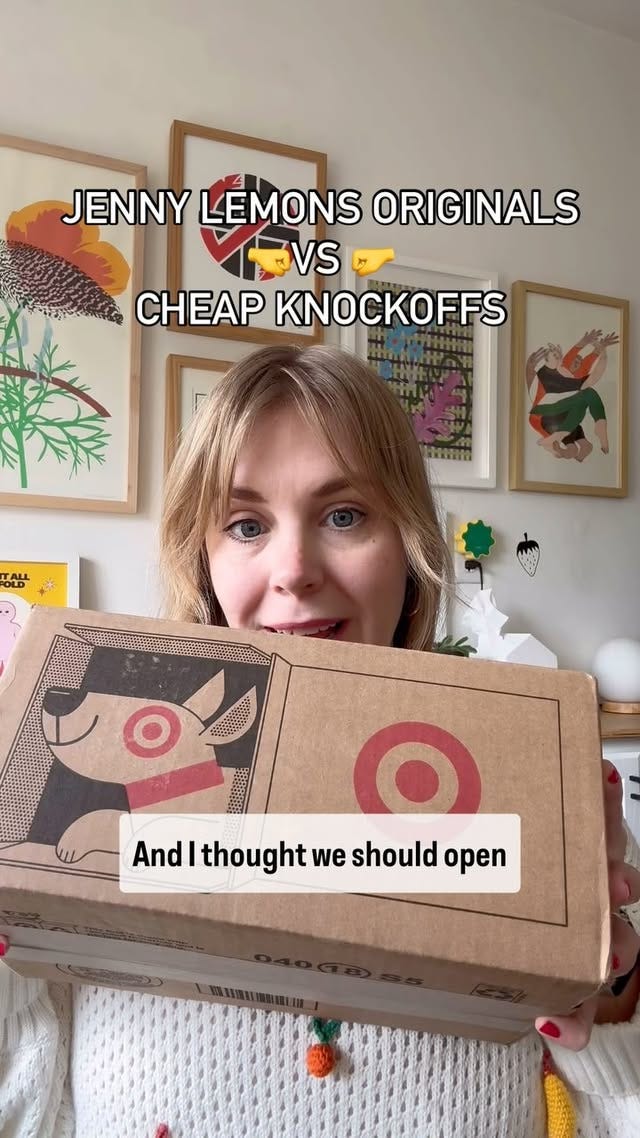Who do dupes hurt? A case study
"Small business owners" are faceless non-identities. But real people *are* impacted by cheap, copycat replicas of their IP. And we're all worse for it.
You know it, I know it, we all know: Buying “dupes” — a pervasive internet term used to describe duplicate products, or items that look like the so-called real thing — can impact the bottom lines of smaller brands and businesses.
But cognitive dissonance comes in handy when you’re an everyday consumer: Who wouldn’t want to spend less for something that seemingly does the same job as its original?
I recently spoke to Jennie Lennick, the owner and artist behind the brand Jenny Lemons, about her experience of discovering Target (were you looking for another reason to be mad at them?) had ripped off her design.

Jennie has been making these food-inspired hair accessories for years. Recently, she came across a Reel from an influencer who was sporting the Target knockoff. “I saw it and was like, ‘Wow. These look really similar to my stuff,’” she said.
Jennie left a pretty simple comment on the video — “These look like my hair claws 😭” — and the support started rolling in, including over 4,000 likes on the comment alone, along with responses from people vowing to buy her version instead. She later took to her brand account to make a comparison video between Target’s dupe and her OG product:
“This retailer has done a great job of doing the thing to help avoid copyright infringement where they make like four changes just to make it different enough,” Jennie says in the video.
While she doesn’t come across as overtly despondent in the video (“I wanted to be positive”), the artist didn’t find Target’s imitation a form of flattery, but instead a punch in the gut.
“Target hurts specifically because I’m from Minneapolis and Target knows who I am,” Jennie told me, adding that she’s talked to corporate buyers at shows and held a soft spot for the brand. Target’s flagship store is in Minneapolis, and Jennie has fond memories of growing up around it. Her friends from high school worked there, and, like a lot of us, she previously regarded the store as “marginally better” than the likes of Walmart for doing things like uplifting queer artists during Pride (“or, they used to”) and offering inclusive sizes, showcased on inclusive-sized mannequins. “But they’re just as bad as everyone now.”
The Midi Red Strawberry Hair Claw Clip from Jenny Lemons retails for $20. At $5 a pop, Target’s version is 75% percent cheaper — and, to add insult to injury, it comes in cute packaging. As Jennie points out, when something comes this cheap, your flags should be raised: Some kind of shortcut is being taken, whether it’s shitty materials (indeed, this one’s crap plastic, while JL’s uses a more durable, less toxic cellulose acetate), unfair wages (probs!), or some other sinister cheat code.

“I would have been so honored to do a line in Target,” Jennie says. But now her perspective has shifted. She feels less passionate about the brand, echoing the sentiment of the current *culture:* In addition to the one day boycott in February, hundreds of thousands of Americans are currently boycotting fasting from the retailer for Lent, in part, for dropping its DEI commitments.
One follower suggested Jennie return her Target claw clips after shooting the video. When she went online to process the return, “they said no need to send them back, here’s a full refund,” Jennie said. Kind of galling, no?
Target’s nonchalance around recouping the refunded items underscores how little value these items hold for the corporation. The cost of processing the return, re-shelving the products, and whatever else stores have to do all outweigh the very products themselves.
If you try to live by your values (and if you were inspired by the sentiments behind the economic blackout) perhaps it’s fair to reason that you’re paying more when you give $5 to Target vs. $20 to a seller like Jennie. Those five bucks feeds a retailer that has already eliminated so much of the competition (and creativity), while knocking an independent artist another rung down the ladder, making it even harder to survive. (Is this too dramatic of a framing? Please do weigh in.)
To be clear, this is Target’s doing, not the customer’s. But dupe culture is inherently addictive: The euphoric rush that comes from nabbing an item for less than its perceived value feels like gaming the system when, in truth, it’s the system that’s gaming you.
Many Target shoppers will have no clue that the cute hair clip they just picked up is a dupe of one by an independent artist who spent seven years in school for painting and has “busted her ass” in countless mediums to find success. And that’s no fault to them. But I think this case study is a good example/reminder that the $5 impulse buys that mega retailers treat like literal garbage are just that. It’s all shit, baby!
TYSM for reading all the way down here! If you enjoyed this read, please like and/or leave a comment, which can help this publication grow. If you are reading this as an email, click the heart button at the top or bottom of this email: You’ll be directed to the Substack website where you can also leave a comment. If you are reading it online, just click the heart button at the top or bottom of this post. I’d truly love to hear from you. Thank you!





